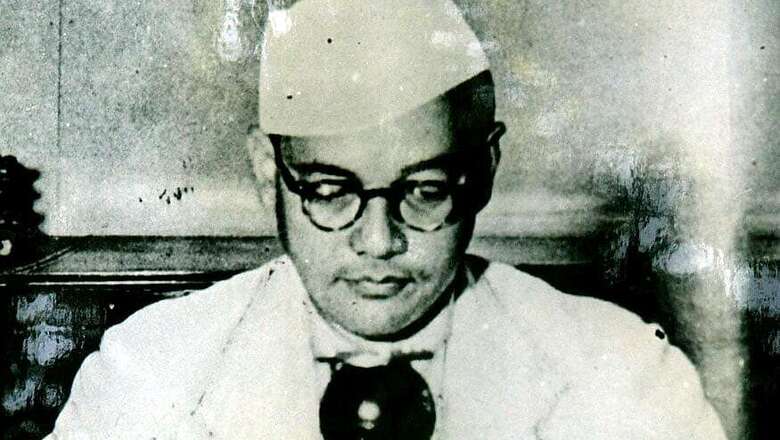
views
A month before he resigned as the President of the Congress, Subhas Chandra Bose ended his Presidential address on March 10, 1939 with, ‘Bande Mataram’, refusing to acknowledge the controversy brewing around the decision to truncate the song - one that continues today.
The controversy: whether the song - with its adoration of Goddess Durga - be performed as the national anthem at Congress gatherings, risking the outrage of those practising monotheistic faiths.
At Bose’s suggestion, Jawaharlal Nehru sought the advice of Rabindranath Tagore. Tagore wrote privately to Bose that the song was “wholly inappropriate" but pointed out to Nehru that the first part of the song stood independently. He wrote, “in our national quest, we need peace, unity, good sense…not endless rivalry." The suggestion was adopted by the Congress, much to the chagrin of the Bengali Hindu right who heaped abuse on Bose and Tagore.
This episode underlined the contradictions that shaped Bose’s politics, as he went on to organise the All India Forward Bloc (AIFB) later.
A self-described socialist, Bose didn’t share the misgivings about religion that Nehru did. Inspired by Swami Vivekananda and Sri Aurobindo, he criticized the growth of communal politics that “accentuated inter-communal tension". A nationalist, Bose conceived the nation as reflecting the harmony of communities and rued the lack of “cultural intimacy" between Hindus and Muslims.
Textbook histories have long since ironed out these contradictions. But Wednesday, on his 122nd birthday, as countless Netaji busts are garlanded and his exploits are eulogised by the entire political spectrum, the party he shaped is preparing to contest polls - for the first time in 61-years, without a seat to defend.
In December, the party decided to “rejuvenate the organizational activities" and campaign to ‘Rebuild India in Netaji’s Way’, putting forth Bose’s philosophy as a political alternative. But they aren’t the only one staking claim to Netaji.
Three years ago on his birthday, days after the West Bengal government declassified the files pertaining to Bose, CM Mamata Banerjee had said that it was a “shame" that “we still don’t know about his whereabouts". Last month, Prime Minister Narendra Modi donned the Indian National Army (INA) cap and renamed three islands in Andaman and Nicobar Island after Bose. He is set to inaugurate a museum on Wednesday at the Red Fort - the site of the INA trials.
“It’s a farce," said four-time former MP Debabrata Biswas. The general secretary of the AIFB - that rare Left front constituent that doesn’t demand atheism of its members - invoked a story about Mansa, the goddess of snakes.
“He’s wearing the INA cap, the way Mansa is worshipped with her left hand. It is not the real reason. He (Modi) had actually gone to pay their homage to (Veer) Savarkar," Biswas said.
Best Front Forward
Created by Bose with the aim of rallying leftists against the “menace of right consolidation", the AIFB was relegated to the margins after his Great Escape in 1941.
Declared a banned outfit, the party met in 1946 - a year after Bose’s reported death. They decided to boycott the Constituent Assembly as a mark of protest against the partition - the only party to do.
It wasn’t until 1958 that the Forward Bloc decided in Baghora, Madhya Pradesh that although “ballot boxes" can’t end “capitalist exploitation", the party “can and should participate in elections." Since then, it has contested every general election and won, at least a single seat, in each one of them. That is, until 2014.
The 1968 Assembly election in West Bengal saw the party win 42 seats in an assembly of 280 - more than a seventh of the total seats with a vote percentage of 10.58%. CPI(M) emerged as the largest party, with 80 seats and the United Front government saw Ajoy Bose of Bangla Congress as CM and Jyoti Basu, of CPI(M) as deputy CM. The victory was, however, short lived.
For over a decade, the state remained plunged in chaos. Political scientist Partha Chatterjee described the magnitude of the “repression" from 1970-73 as “unlike many other parts of India". Chatterjee writes that “Calcutta saw little in the year and a half of the Emergency to add to what it already knew about the ways of an authoritarian regime."
Ahead of the 1971 Assembly elections, the United Front split in two. In 1971, AIFB won only 3 seats in the Assembly. In the 1977 election though, the year that marked the beginning of the Left Front with Jyoti Basu at its helm, the AIFB won 25 of the 36 seats. As the Left Front consolidated its political support base, the AIFB also benefited. Its numbers wouldn’t dip once below the 20-seat mark until the 2006 Assembly elections.
However, the unity that Netaji had desired, was not easy. The CPI(M) was a behemoth within the Left Front and smaller parties like the AIFB were relegated to areas like Cooch Behar, Purulia and Birbhum where the popularity of its leaders like five-time MP Chitta Basu from Barasat, or its organisational strength retained its independence. The result: frequent, bloody clashes.
“These clashes wouldn’t take place in areas where the CPI(M) was strong. That is how such politics works in Bengal, even today. The clashes would take place in areas where the other constituents were strong. Congress was the party of the upper classes and the Left of the have-nots. But within that, there was another dichotomy. So, a rickshaw trade union would be with the AIFB and the CPI(M) would have the taxi union," said a senior AIFB leader.
Disputes within the Left Front sharpened after the 1987 Assembly elections, particularly with AIFB and the Revolutionary Socialist Party (RSP). Some of these centered around the high-stakes three-tier elections to the panchayat bodies in 1988 while others revolve around policy issues - a theme that continued and proved disastrous in the coming decades.
“There is a difference between Leftism and the Left Front," said Debaprata Biswas, AIFB general secretary and admitted that maintaining the Left Front had damaged the AIFB’s independence. “There is some truth to that," he said.
In 1996, the Left Front suffered its first set back, with nine incumbent ministers failing to get re-elected and by the general elections in 1998, the CPI(M) lost a quarter of the seats it contested. The AIFB lost a seat and its vote share dipped. The leader explained, “It is like matsyanyaya in Indian political theory, where the big fish devours the smaller fish. That is what happened with the Forward Bloc and the CPI(M). We had ministers in the cabinet, but we were dependent on them as a party. They swallowed us whole."
When Meghnad Saha, Indian astrophysicist, had asked Bose at the Indian Science News Association in 1938 if the “India of the future" is going to “revive the philosophy of village life", Bose - then the Congress president - had distanced himself from many in the party and said, “I may without any exaggeration highlight that the rising generation is in favour of industrialisation."
Decades later, faced with successive defeats, the Left Front found itself trapped between two contrasting imperatives of needing to adapt to the liberalisation and the need to remain true to its traditional communist ideology and support base. The solidarity of the Front with Forward Bloc and other parties was finally fractured with the land acquisition row surrounding Singur and Nandigram, which was supported by the upper echelons of the CPI(M).
After it lost power in the state, Biswas had admitted that “The acquisition drive alienated the masses in Bengal" and squarely pinned the blame on the CPI(M) for keeping the smaller parties out of the loop. "There has to be a total change in the approach and attitude of the CPM leadership, both at the central and the state level, if the Front wants to turn around in the days to come," he had warned. The warning appeared not to have been heeded.
In 2016, the AIFB was down to 2 seats from 11 in the Assembly. Biswas admitted that electorally the party had suffered losses, but added, “The issue is that today politics is about communalism, casteism, criminalisation and corruption. In order to contest in electoral politics, we need to first create a movement among people. That is our focus, once you’ve the masses with you, victory is inevitable."
But Udayan Guha - the son of legendary Forward Bloc leader from Cooch Behar, Kamal Guha - who switched to Trinamool Congress before the 2016 polls and won has a different argument. “Netaji belongs to everyone. Many people will say that Netaji belongs to them and had he been here, he could’ve answered. But everyone knows that Netaji wasn’t valued by successive governments in Delhi - but as far as the Forward Bloc is concerned, they only have themselves to blame. Has any party in Indian politics splintered as many times? Not even the Congress. They all want to be ‘leaders’ and want to use the party for their own benefit."
Philosophical Justification
Bose, in his thesis, ‘Forward Block - Its Justification’ had described the organisation as a “revolutionary and dynamic organization" that doesn’t “swear by copy-book maxims or by text-books of politics or economics" and regarded “progress as an eternal process to which India also has a contribution to make". But for now, the AIFB maintains that its top priority is to ensure the defeat of the BJP government at the Centre in the next election and, in December said, that it would keep “all post polls options" open to achieve that.
The BJP government, it argues, stands for everything that their founder didn’t. The ruling party has “openly declared that there aim is to create an opposition free India", it is “bypassing the Parliament and issuing ordinances on important issue" and apart from its “communal agenda", it is “satiating the interest of the corporates". “The Party Congress has reviewed that the need of the hour is that to strengthen independent and joint mass movement against communalism, fascism and corruption. The AIFB will take all possible steps to strengthen such people’s movements," said the party, in a statement in December.
The campaign, the party had decided, would demand, among others, the introduction of state funding of polls and the withdrawal of electronic voting machines. After the Congress, Biswas when asked about whether AIFB was open to a situation like 2004, when Left parties decided to provide outside support to the Congress to keep the BJP at bay, he replied, “No one can say what situation will evolve after elections. But we were open to all options, our main aim is to oust the BJP from power."
A senior leader added, “That might be the case, but right now, the party still has to rebuild in the areas it has lost ground. It won’t be easy, otherwise, we will be destroyed." Netaji, for one, was confident that as long as the Forward Block had a “philosophical justification", “it will surely endure. If it serves the cause of India, of humanity and of human progress, it will live and grow and no power on earth will ever destroy it."


















Comments
0 comment